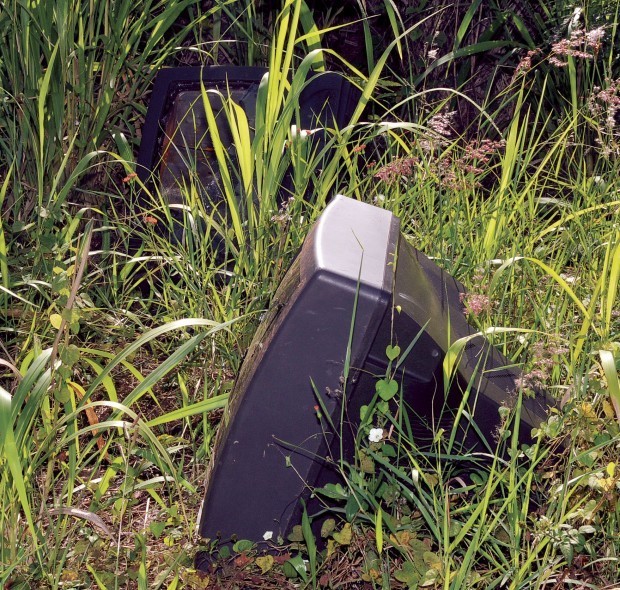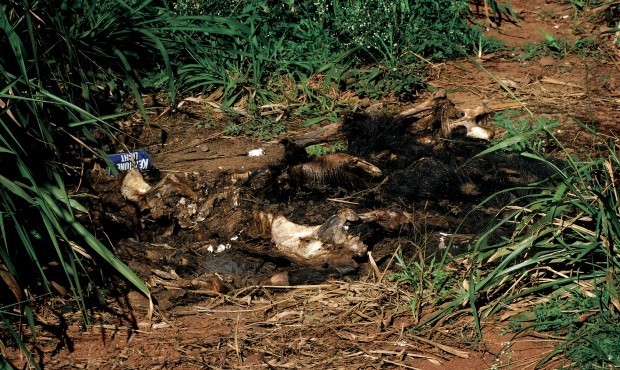LIHU‘E — Out of sight, out of mind.
That must be what people tell themselves when they dump their unwanted items in the bushes or flip cigarettes out the windows of their cars, said state Department of Land and Natural Resources Kaua‘i aquatic biologist Don Heacock.
“Just because you don’t see it anymore does not mean it doesn’t exist,” he said.
“Litter runs downhill” and every discarded item impacts the ecosystem, such as cigarette butts which travel through storm drains and out to the ocean where their chemicals are released and people fish or swim, he said.
“You can’t just throw something away,” he said. “It never goes away.”
People have been “turning their backs” on the issue of illegal dumping and littering, as plastic bags continue to line portions of the highway and larger items are being dumped in bushes waiting for someone else to properly dispose of them. “Eradicating ‘opala from Kaua‘i” is something Heacock said he hopes will come to fruition.
“We cannot change our behavior unless we change the way we think,” Heacock said, adding that getting people “emotionally involved” in caring for the ‘aina could be one way.
Littering is a criminal offense under Hawai‘i Revised Statutes. Anyone caught will need to complete four hours of community service for the first offense. For any subsequent offense, eight hours of community service are to be completed. In addition, the court may fine defendants up to $500.
Criminal littering, a petty misdemeanor, is defined in HRS as “knowingly” placing, throwing or dropping litter on any public or private property or in any public or private waters — and the fine amount rises to between $500 and $1,000.
Throughout the past five years seven citations were issued for criminal littering, according to the Kaua‘i Police Department. Three were issued in 2005, one each in 2006 and 2007, none in 2008 and two in 2009. So far this year, no citations were issued as of Jan. 15.
“Depending on the location of the dumping, state highways or our county Roads Division picks up illegal dumps,” said Allison Fraley, the county’s recycling coordinator, via an e-mail last week when asked who is responsible for properly disposing of someone else’s trash.
No records currently exist regarding the types of items dumped or the frequency and location they typically occur, she said.
Hulemalu Road, which travels past the Menehune Fishpond Lookout, has been a hot spot for illegal dumping and littering. Bags filled with trash, old mattresses, beer bottles and cans, food containers and pig carcasses can be found there, Heacock said.
A member of Nawiliwili Watershed Council, Heacock said there is no coincidence Nawiliwili Bay is polluted. The bay is fed by at least four different streams in the area, according to the Assessment and Protection Plan for the Nawiliwili Watershed.
“Our solution isn’t just picking up other people’s rubbish” it’s getting to the bottom of why people are doing this and helping to educate them about the importance of taking care of the ‘aina, he said.
“Businesses and residents will need to take more personal responsibility over the waste they generate by adopting proper waste diversion and disposal habits,” Fraley said. “If everyone did this, we’d have less litter and a fantastic diversion (recycling) rate. Unfortunately, connection with one’s garbage and taking personal responsibility for it is rare.”
Initiatives like curbside recycling, economic incentives (HI-5 redemption) and legislation which could enforce bans on disposal are examples of ways which might help “increase responsible waste diversion and disposal behavior among the general population,” she said.
To report a case of illegal dumping or littering, call crime stoppers at 241-1887.
• Coco Zickos, business and environmental writer, can be reached at 245-3681 (ext. 251) or czickos@kauaipubco.com.



